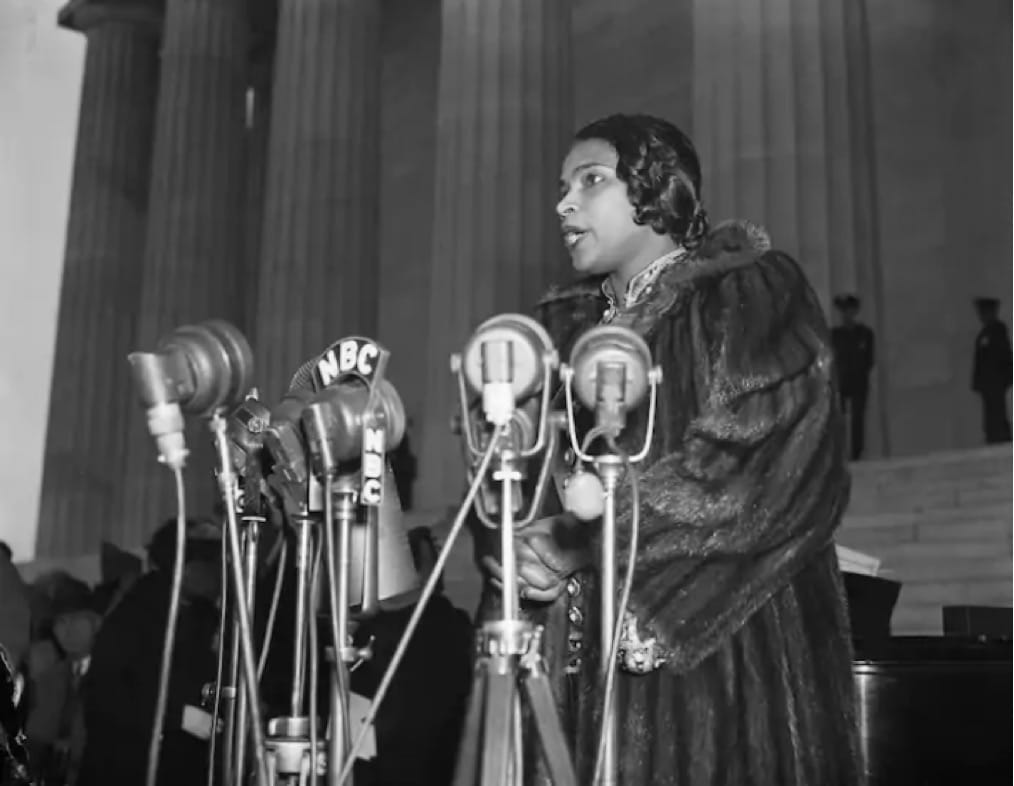On a wintery evening in February 1938, American singer Marian Anderson enthralled a Lobero audience with her extraordinary contralto voice.
Known for her warm and modest personality, few audience members knew that just 3 months earlier she had defied Nazi death threats and given a sold-out, European farewell concert in Vienna, Austria.
As an African-American, Marian Anderson had found 1930’s Europe to be a refuge from the institutional racism she had experienced in the U.S. But by 1937, and the rise of Hitler’s Germany, Europe was no longer a safe haven. Anderson’s performance at Vienna’s Musikverein concert hall represented the end of an era. As explained in the New Yorker Magazine,
“One Viennese music critic stated that the audience had witnessed something bigger than itself—a performance of musical brotherhood despite a rising tide of racial hatred.”
Marian Anderson was born in Philadelphia, Pennsylvania in 1897. From the age of 6 Anderson sang in the choir of the Union Baptist Church, where she so impressed the congregation that they raised money for her to attend music school. In 1925, Anderson entered a contest with 300 competitors and won first prize – the opportunity to sing with the New York Philharmonic Orchestra. Several years later, at the age of 30, she received a scholarship to study in Berlin.
In 1933, Marian Anderson made her European debut in London. She spent much of the 1930’s touring in Europe, where audiences and critics alike were awed by her incredible vocal range. Anderson’s pure vocal quality, richness of tone, and tremendous range made her, in the opinion of many, the world’s greatest contralto
Marian Anderson’s most famous performance came in 1939 after the Daughters of the American Revolution (DAR) refused permission for her to sing before an integrated audience in Constitution Hall in Washington, D.C. First Lady Eleanor Roosevelt was the first of many prominent DAR members who resigned in protest, and at the invitation of the federal government, Anderson was invited to perform at the Lincoln Memorial. On Easter Sunday, April 9, 1939, Marian Anderson sang for a live crowd of 75,000 and a radio audience in the millions.
The New Yorker Magazine explained the significance of the performance, “The impact was immediate and immense; one newsreel carried the legend “Nation’s Capital Gets Lesson in Tolerance.” But Anderson herself made no obvious statement. She presented, as she had done countless times before, a mixture of classical selections. Perhaps there was a hint of defiance in her rendition of “My Country, ’Tis of Thee;” perhaps a message of solidarity when she changed the line “Of thee I sing” to “Of thee we sing.” Principally, though, her protest came in the unfurling of her voice—that gently majestic instrument, vast in range and warm in tone.”
While we wait in the wings for things to return to normal, we hope you enjoy a peek into the Lobero archives.
We hope you’re staying safe and enjoying the arts from the comfort of your own home. Go ahead and read more stories below.
Sources
- https://www.newyorker.com/culture/cultural-comment/when-marian-anderson-defied-the-nazis
- https://www.newyorker.com/magazine/2009/04/13/voice-of-the-century
- https://en.wikipedia.org/wiki/Marian_Anderson














